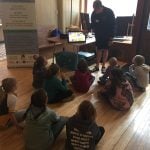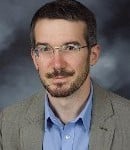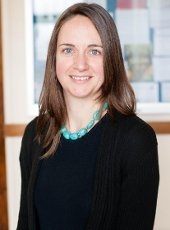
 IHA PhD Student Michael Bleddynn and undergraduate students from the Historical Environments Spatial Analytics Lab used the Keweenaw Time Traveler to introduce 4th graders from around the region to how to use GIS technologies to see how communities change through time. The activity was part of the Keweenaw National Historical Park’s CopperTraces program.
IHA PhD Student Michael Bleddynn and undergraduate students from the Historical Environments Spatial Analytics Lab used the Keweenaw Time Traveler to introduce 4th graders from around the region to how to use GIS technologies to see how communities change through time. The activity was part of the Keweenaw National Historical Park’s CopperTraces program.

This week, the Deans Teaching Showcase recognizes Roman Sidortsov, assistant professor in Social Sciences. Sidortsov studied at universities in Russia, the US and Great Britain and his credentials include a JD, LL.M in environmental law, and a PhD in polar studies/geography. His research explores energy justice, risk governance, and comparative energy and environmental law and policy in the Arctic.
Dean Bruce Seely in the College of Sciences and Arts identified Sidortsov for accomplishments in Global Issues, a demanding first-year gen-ed course offered by Social Sciences. Seely’s interest was piqued by Sidortsov’s student rating score of 4.53 in a class where very good instructors average 3.8 to 4.0.
Global Issues fits a well-known pattern, in which students in large format, non-major, required courses rate faculty lower than teachers in smaller courses for majors. But Sidortsov, who joined Social Sciences in 2016, seems to have found ways to overcome the initial resistance students exhibited to this type of course. “Virtually every Tech student,” he noted, “comes with a desire to succeed” regardless of their major. So he begins class by asking students “about their vision of success in the classroom, upon graduating from Michigan Tech and several years after graduation.”
Then he works to reconcile his ideas of success with those of his students. “For the second year in a row,” he reported, “my search for the golden mean ended with developing a capacity to think critically in the global context.”
Importantly, this approach shows students the importance and relevance of the Global Literacy and Information Literacy learning goals his class addresses. Instead of wondering why the course matters, students come to see the value of critical thinking in the class, in their majors, in their professional careers, “and in terms of civic engagements, whether it be winning an argument in a boardroom or not falling for a false narrative on social media.”
Thus, his students understand not only why this course matters now, but also the importance of critical thinking as a life-long learning skill. He added that it is a “privilege to be one of the people who gets to start the bright women and men who come to Michigan Tech on this path. Thus, I do my best to make this process relevant, useful and entertaining.”
One strategy he employs are class exercises, such as a discussion concerning the risks associated with nuclear power plants from the points of view of three different stakeholder groups. In another exercise focused on different types of human migration, Sidortsov asks students to develop criteria for locating a research and development center. He added he is fortunate “to utilize my experience of growing up in a foreign country, as well as my professional experiences prior to joining academia. I draw on personal experience often, whether to excite students about study abroad or to save them from afternoon sugar comas.”
He concluded that “sharing a vision of success with your students and working toward it is perhaps the most important and enjoyable strategy that I have employed at Michigan Tech.” His insight matches the recognition that students respond to courses, exercises and faculty who engage with students enthusiastically, opening not only the course content but themselves as persons to the students. He certainly seems to be on to something.
Sidortsov will be recognized at an end-of-term luncheon with other showcase members, and is now eligible for one of three new teaching awards to be given by the William G. Jackson Center for Teaching and Learning this summer, recognizing introductory or large-class teaching, innovative or outside-the-classroom teaching methods, or work in curriculum and assessment.





